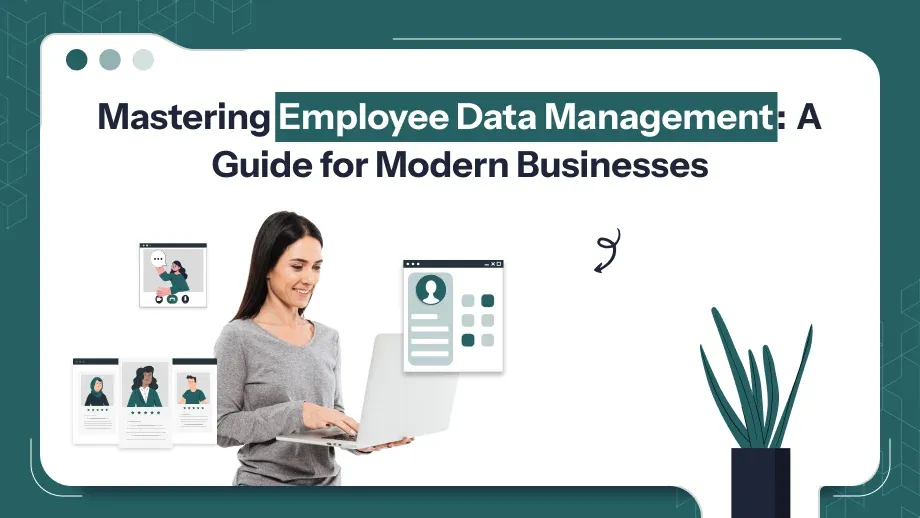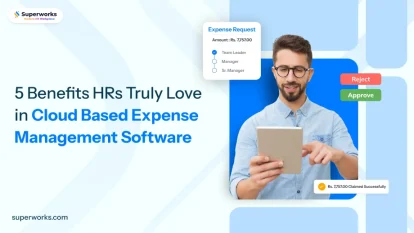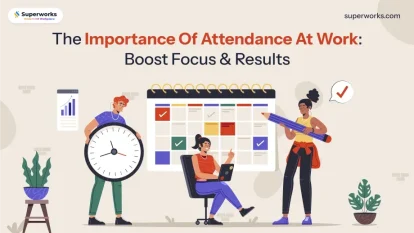
Modern HR operations rely heavily on efficient employee data management, which will enable organizations to store, organize, and secure critical workforce information, such as personal details, job records, and performance metrics. Centralization of data and automation will help reduce the number of errors, ensure labor law compliance, and make more data-driven decisions for improving productivity in the workforce. With the advanced HRMS solutions, managing employee information becomes quite seamless, permitting HR teams to focus on strategic goals and improve overall operational efficiency.
What is Employee Data Management?
The main role of employee data management is to collect, organize, store, and analyze all the information concerning an organization’s workforce, including personal details, details about jobs, and performance-related information, so the data collected is accessible, accurate, and safe while complying with labor laws and data protection regulations.
For instance, organizations can consolidate employee records through automatic management via the cloud based HRMS software that prevents the use of incorrect documents and saves vital time.
Why Collect Employee Data?
Collecting employee data management is essential for various reasons:
- Streamlining HR Operations
Appropriate data collection enables the automation of payroll processing, attendance recording, and leave approval, hence making HR more efficient.
- Enhancing Decision-Making
Employee data analysis provides trends about the workforce, performance, and engagement levels, thus ensuring data-driven decisions.
- Ensuring Compliance
Up-to-date employee records ensure compliance with labor laws and tax regulations. Organizations are assured of reduced risks in compliance.
- Improving Employee Experience
Precise personal data on the employees by HR teams allow for personalized benefits, timely processing of payroll, and an inspiring work environment.
Examples of Employee Data
Employee data can be categorized into various types, each serving a unique purpose. Here are some examples:
Personal Data
- Name, address, contact details, and emergency contact information.
- Date of birth, nationality, and gender.
Job-Related Data
- Job title, department, and employment status.
- Salary details, benefits, and job history.
Attendance and Performance Data
- Work hours, overtime, and leave records (tracked through an attendance management system software).
- Appraisals, feedback, and performance metrics.
Legal and Compliance Data
- Tax records, contracts, and certifications.
- Government identification numbers (e.g., PAN, Aadhaar in India).
How Do You Find and Manage Employee Data?
Employee Self-Service Tools
Allow employees to update their information, such as address changes or tax details, using HRM software for small business. This minimizes errors and saves HR time.
Centralized HRMS Solutions
Use tools like HRMS & payroll software to collect, store, and manage data in a single location. Features like automated backups and encryption ensure security.
Regular Data Audits
Conduct periodic audits to ensure data accuracy and eliminate outdated records.
Cloud-Based Data Management
With cloud-based HRMS software, organizations will securely store their employees’ information and allow remote access. It ensures reliability by auto-backing the data.
Automate Data Collection
Leverage employee onboarding software to gather information and sync it directly with your HR system during the hiring process.
Customizable Reporting Tools
HR teams can leverage hrms solutions to generate detailed reports on attendance, performance, and payroll, simplifying data management and analysis.
Secure Role-Based Access
HRM systems deploy role-based access to secure sensitive information on employees while granting access and making changes to vital records by authorized personnel.
Types of Employee Data Management
Managing different types of employee data is a core aspect of employee data management. Here’s a breakdown of the key categories:
Personal Information
This includes employee details such as name, date of birth, gender, marital status, and contact details. Emergency contact information and nationality constitute personal data; these are used to keep employees’ records current.
Job-Related Data
Job-related data encompasses all information that highlights an employee’s role within the organization, such as job title, department, and employment status: whether permanent, part-time, or contractual. This also includes reporting structure, employment history, and tenure.
Attendance and Work Hours
Data related to attendance, work hours, and leave balances is essential for payroll processing. Companies usually use attendance management system software that can track data in real-time to ensure accuracy and efficiency.
Payroll and Financial Data
Payroll data includes salary details, bonuses, tax declarations, and deductions. It also covers banking information for salary disbursement and compliance-related financial records like tax filings.
Performance Data
Performance data consists of employee goals, performance evaluations, and feedback from managers. It also includes training records, certifications, and skills assessments.
Sources for Employee Data Collection
Reliable sources are essential for collecting accurate and comprehensive employee data management. Below are some of the primary sources organizations use:
Employee Onboarding
This step is amongst the vital steps that provide sources to collect employee information. In this process, new employees furnish personal and professional information like address, social security number, tax return forms, and credentials. Well, this step is made error-free and smooth through the tools referred to as employee onboarding software.
Attendance Systems
Attendance data is collected through systems such as biometric devices, swipe cards, or software solutions like attendance management system software. These systems record clock-ins, clock-outs, overtime, and leave balances.
HR Portals
Self-service HR portals in many organizations where employees can update their data like contact information, tax details, and leave requests reduce the manual workload for HR teams but ensure accuracy.
Surveys and Feedback Tools
Employee surveys as well as feedback forms help in collecting data concerning the employee satisfaction level, engagement, and opportunities for change in the employees.
Performance Management Systems
Data on performance metrics, goals, and feedback is collected through performance tracking tools, helping HR teams make informed decisions about promotions or training needs.
HRMS Integrations
Advanced hrms solutions integrate data from various sources like payroll systems, attendance tracking tools, and performance management software into one centralized platform.
Using HR Software for Employee Data Management
Modern HR software has upgraded how organizational data of personnel are dealt with, as one can conveniently collect, store, and then analyze data. Here’s how HR software streamlines the process:
Centralized Data Storage
HR software stores all employee data management in a single, centralized system, eliminating the need for multiple spreadsheets or manual files. This allows HR teams to access any required data instantly and ensures consistency across all records.
Automation of HR Tasks
Tasks such as attendance tracking, payroll calculations, and compliance management are automated with the help of the best HRMS and payroll software in India. This reduces the chances of errors while saving significant time.
Enhanced Security
HR software includes features such as encryption, secure logins, and role-based access to protect sensitive employee personal data from unauthorized access or breaches.
Real-Time Reporting and Analysis
With built-in analytics, HR software enables real-time employee data analysis to track performance trends, employee satisfaction, and attrition rates. This data helps organizations make better decisions.
Scalability for Business Growth
HR software, such as hrm software for small business, is scalable to grow with your organization. As the workforce increases, these tools ensure seamless employee data management without additional complications.
Self-Service Features
Employees can update their data, view their leave balance, and download payslips without approaching HR through self-service portals. It enhances the employee’s satisfaction level and minimizes the workload on the HR teams.
Compliance Management
Compliance tracking within the HR system, which focuses on labor, tax, and data protection legislation. The use of the best HRMS software and payroll processing software in India is automated; it reduces any risks of having to pay penalties for non-adherence.
By using HR software, it becomes easier to manage data while increasing accuracy levels and improving decisions. Advanced cloud-based HRMS software ensures security, accessibility, and up-to-date employee information.
Conclusion
Thus, effective employee data management in HR is the backbone of proper HR operations. It includes streamlining day-to-day activities to provide data-driven insights. Proper employee information management ensures that an organization is compliant, increases employee satisfaction, and supports growth. Investment in tools for employees such as the HRMS software in India can ease this process in the first place by making it automatic, more accurate, and secure. Ready to change the way you work with employee data? Explore HRMS solutions today and unleash the power of your workforce.









